Meet the Michigan Ross Student Co-Chairs Hosting the ClimateCAP 2024 MBA Summit
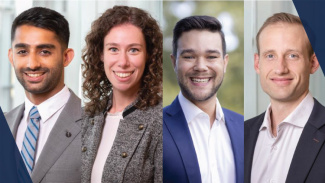
On Feb. 9-10, the Ross School of Business will welcome a crowd of more than 500 people, including 400 MBA students, from around the country to this year’s ClimateCAP MBA Summit.
The ClimateCAP Initiative is a global partnership of more than 40 schools dedicated to preparing MBA students to take on the climate crisis challenges of today and tomorrow.
Each year, the ClimateCAP Initiative hosts a summit event that brings together students and business leaders from across the country and the world to discuss how climate change is impacting the global economy, as well as what actions businesses could take to mitigate risk and make meaningful change.
Michigan Ross will be hosting this year’s event, which was put together by a student planning team, three faculty advisors from the Erb Institute, and four student co-chairs leading the organizational effort.
To get a better understanding of what attendees can expect and what inspired the hosts to bring ClimateCAP to Michigan Ross, we asked the four event co-chairs for their perspectives.
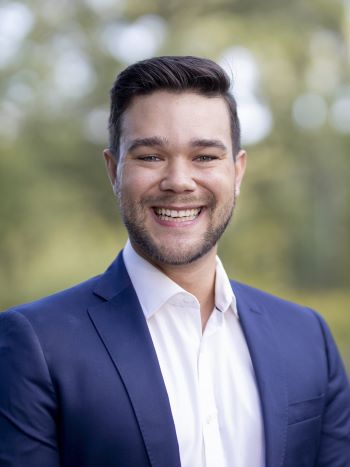 Nick Rojas, MBA/MS ’24
Nick Rojas, MBA/MS ’24
About Me
I was born and raised in Sacramento, California, and went to the University of California, Los Angeles, where I graduated in 2013 with a degree in geography.
What's your focus at Ross?
I was admitted as a dual-degree student through the Erb Institute, and I focus on bringing ideas out of the lab into the market and scaling them to the size we need to address climate change. I am interested in learning how we can embed equity and responsible capitalism into business so it's less of a "saddlebag" mentality and permeates company purpose.
What are your post-grad career goals?
I am recruiting for early-stage venture capital firms that invest in the climate/sustainability/natural capital spaces.
How and why did you get involved in ClimateCAP?
I was impressed and inspired by the idea of bringing together MBAs focused on the intersection of climate and business after attending the ClimateCAP Summit at Northwestern University in 2022. I remember telling my classmates how cool it would be if Ross had the opportunity to host it one day, and the idea has been embedded in my head ever since. By December of 2022, I started reaching out to other students who might be interested in hosting; we submitted our bid by January and found out in Austin at the 2023 conference.
How is the conference making itself sustainable?
We're trying to tackle this from many different angles. A key one has been to refuse and reduce by eliminating conference giveaways that often get used once or twice (if at all) and thrown away. We've even trimmed down name tags by encouraging attendees to bring their own, and if they do need one, we will make a high-quality one that can be reused after the conference. We've eliminated red meat from the menu, focusing on vegetarian-forward options with chicken and fish. All plates and cutlery are reusable and washed onsite with the catering firm. For tough to reduce emissions, particularly around travel, we're purchasing high-quality carbon offsets that invest in communities and natural capital.
What are you most looking forward to at the conference?
I'm so excited to meet the 400+ other MBAs passionate about addressing climate change who are coming to Ann Arbor. We're working hard to provide intentional, meaningful opportunities for attendees to engage with one another, and I look forward to joining in on the conversations.
What has been the most rewarding part of planning this?
I feel so fortunate to be working on this with my fellow co-chairs. Even during the toughest moments, they've always been there supporting me and reminding me why we are doing this together. It's incredibly rewarding to be doing this conference with them and seeing it all come together.
How did you come up with this year's topics and theme?
We wanted to capture the present energy in the movement to address climate change in the United States and globally. The debate is over on whether climate change is real and caused by humans — now we are focused on what we are going to do about it. We have some incredible tailwinds from the Bipartisan Infrastructure Law, CHIPS Act, and Inflation Reduction Act on the policy front. Renewable energy sources are cheaper than ever and on par or more affordable than new fossil fuel-based infrastructure, and there is public and private sector pressure to do something meaningful.
The movement is in motion, and now we must ask ourselves what kind of future we want to create with that momentum. Our hope is that the theme and topics addressed add to the important discussions happening across the globe at other conferences, board rooms, and family dinner tables.
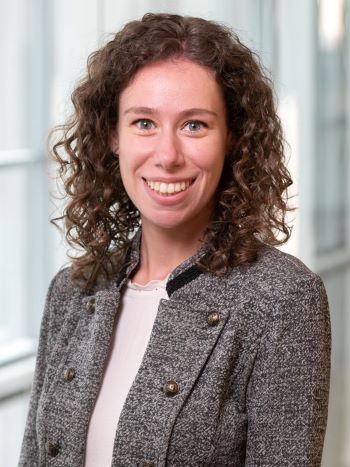 Sarah Cohen, MBA ’24
Sarah Cohen, MBA ’24
About Me
I am originally from Short Hills, New Jersey. Prior to Ross, I lived in Seattle, Washington, and worked in change management consulting at Accenture.
What's your focus at Ross?
At Ross, I am focused on marketing with a sustainability focus. I came back to school to transition careers, learn more about sustainability, and hopefully incorporate it into my next job.
What are your post-grad career goals?
After graduation, I will be joining Danone (the parent of Dannon Yogurt) in brand management. Danone is one of the largest B Corps, and I am excited to support its mission of bringing healthy, sustainable food to consumers.
What are you most looking forward to at the conference?
This year, for the first time, we are bringing in a panel of young professionals who graduated with their MBAs three to five years ago and are working in climate jobs. I am excited to hear from people just a few years ahead of me who are finding ways to impact the climate, and I think this panel will be especially inspiring for attendees.
What has been the most rewarding part of planning this?
Leading marketing for the biggest ClimateCAP event yet has been an incredible and rewarding experience. I cannot wait to see the Ross building buzzing with students excited about making a climate difference in their careers.
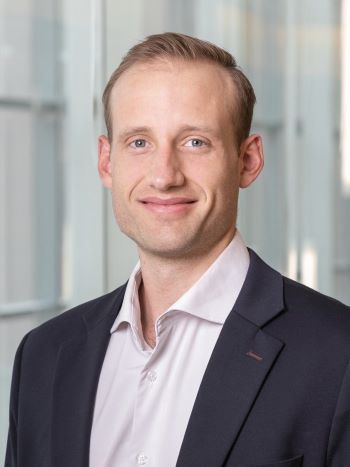 Alex Reid, MBA/MS ’24
Alex Reid, MBA/MS ’24
About Me
I grew up in Metro Detroit and went to Michigan State University for undergrad, so Michigan’s football team winning the national championship is still a bit strange for me!
What's your focus at Ross?
As an Erb dual-degree student, I have been focused on the energy transition, engaging with the technologies and solutions we have today, as well as the challenges to rapid development. I have come to appreciate a systems lens to solving complex problems, and I think the breadth of exposure to technology, finance, policy, etc., has been valuable and informed my thinking on the question of “how do we tackle climate change?”
What are your post-grad career goals?
I want to build expertise in climate project economics to support the commercialization of novel climate technologies. The wind and solar industries have plenty of work cut out to reach our clean energy targets, and I hope to support the ‘long tail’ of the decarbonization of industry.
How and why did you get involved in ClimateCAP?
I got involved about a year ago as our team put a bid together to host the conference at Michigan Ross. As a native Michigander, I was eager to highlight the ongoing transformation of the Midwest’s manufacturing sector. I was fortunate enough to attend last year’s summit and really enjoyed connecting with peers from across the country, paddling in the same direction on climate action in business. It can be a lonely journey, especially for MBAs joining large companies with small climate-focused headcounts. I think it's important to know you have a network that extends beyond your school to look forward to in the workforce.
What are you most looking forward to at the conference?
We have a fantastic set of speakers, and I’m really looking forward to the discussions. On the flip side, the ‘non-programmed’ part of the conference, where conversations carry into meals with our peers, allows everyone to have an active role.
What has been the most rewarding part of planning this?
At some point in the planning process, the ideas and dialogue transformed into an actual event with food, drinks, and hundreds of people coming to campus. Watching that transformation unfold has been sort of crazy and fun, especially alongside the team. We’ve had a ton of support in pulling this together, and seeing everyone contribute in unique ways to ‘make it real’ has been extremely rewarding.
How did you come up with this year's topics and theme?
We wanted to signal the rapid speed required to address the climate crisis and put out a call to action for MBAs to explore careers and functions where they can have an impact. Things are moving quickly, and companies are eager to innovate and build our clean economy. As such, we see the next few years as a critical stage for mitigating and rectifying the marginalization patterns that accompanied our last industrial revolution and the fossil fuel energy economy.
This means internalizing social and environmental costs and creating inclusive development processes that engage with a wide range of stakeholders. We also wanted to highlight Michigan and the Midwest’s place in the climate transition, specifically related to manufacturing and building the tools of the future.
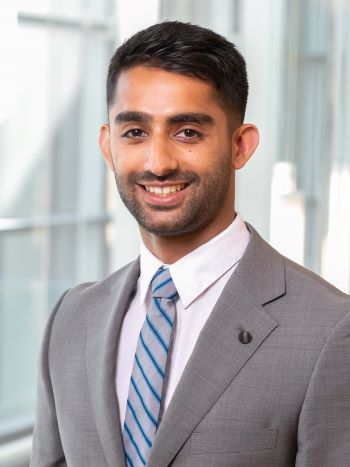 Nikhil Khurana, MBA ’24
Nikhil Khurana, MBA ’24
About Me
I grew up in Melbourne, Australia, and studied chemical engineering. I started my career designing water and wastewater plants, and later as a consultant to infrastructure and utility clients, working in Australia and Texas.
What's your focus at Ross?
Finance and energy. I came to Ross to pivot my career from an engineering and consulting background to the finance side of the clean energy transition. It took me a while, but I realized that even the best decarbonization projects and ideas in the world don’t go anywhere without dollars to support them. Like it or not, finance is crucial in creating the healthy, sustainable planet we dream of.
What are your post-grad career goals?
After graduation, I am joining Marathon Capital, a boutique investment bank focused on raising capital for clean energy and sustainable technologies. My long-term goals are all about helping support energy transition at the scale and pace necessary for future generations to have a home.
How and why did you get involved in ClimateCAP?
I was introduced to ClimateCAP by my fellow co-chair and housemate Nick Rojas. While the challenge of putting on such a large event was initially daunting, I was really excited by the opportunity to talk to people and companies spearheading the energy transition — folks who are having a real, tangible impact at a massive scale.
What are you most looking forward to at the conference?
I'm really excited to meet like-minded MBAs from across the country. We have almost 400 peers flying in from around the country (and the world) to Ann Arbor — in the middle of winter! The excitement and sense of purpose are real and very energizing.
What has been the most rewarding part of planning this?
As the co-chair leading our sponsorship efforts, our team reached out to almost 200 companies and learned a lot about the landscape of leading sustainability companies in the United States. It was immensely satisfying to smash our fundraising goals, even in a tough macroeconomic environment. I also loved working with our co-chair team and board, an amazing set of passionate and driven people.







